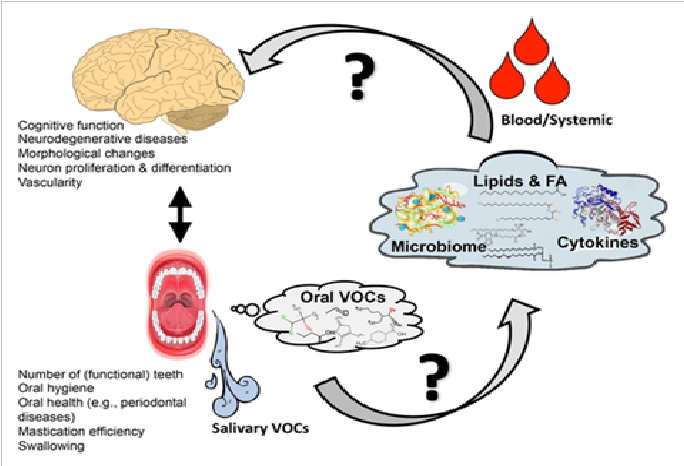
Alzheimer's disease is a progressive neurological disorder that affects millions of people worldwide. While the exact cause of Alzheimer's is still unknown, emerging research suggests a potential connection between oral health and the development or progression of the disease. This article explores the link between Alzheimer's disease and oral health and discusses the implications of this association.
• Gum Disease and Bacterial Infections: Gum disease, also known as periodontal disease, is a common oral health condition characterized by inflammation and infection of the gums and supporting structures of the teeth. Research indicates that individuals with chronic gum disease may have a higher risk of developing Alzheimer's disease. The bacteria associated with gum disease can enter the bloodstream and potentially reach the brain, triggering an inflammatory response that could contribute to the development or progression of Alzheimer's.
• Oral Bacteria and Brain Inflammation: Studies have found specific oral bacteria, such as Porphyromonas gingivalis, in the brains of individuals with Alzheimer's disease. These bacteria produce toxic substances called gingipains that can lead to chronic inflammation. Inflammation plays a significant role in Alzheimer's disease and is believed to contribute to the accumulation of amyloid plaques and tau tangles, which are hallmark characteristics of the disease.
• Poor Oral Hygiene and Cognitive Decline: Neglecting oral hygiene practices, such as regular brushing, flossing, and dental check-ups, may have implications beyond oral health. Poor oral hygiene can lead to the build-up of plaque and tartar, which harbor harmful bacteria. This bacterial load, combined with the inflammatory response in the mouth, may contribute to systemic inflammation and an increased risk of cognitive decline, including Alzheimer's disease.
• Tooth Loss and Cognitive Impairment: Several studies have reported an association between tooth loss and cognitive decline. Tooth loss can lead to difficulties in chewing and may affect dietary choices, resulting in inadequate nutrition. Additionally, the loss of teeth and the resulting jawbone resorption can impact the structure and support of the face, leading to changes in speech and facial aesthetics, which may affect social interactions and overall well-being.
• Oral Health as a Potential Risk Indicator: Some researchers suggest that oral health could serve as a potential indicator or risk factor for Alzheimer's disease. The presence of gum disease, oral bacteria, or poor oral hygiene practices could signal an increased susceptibility to Alzheimer's or serve as early markers for the disease. Regular dental check-ups and maintaining good oral hygiene could provide an opportunity for early detection and intervention.
Recommendations for Oral Health and Alzheimer's Prevention:
a. Practice good oral hygiene: Brushing twice daily, flossing, and using mouthwash can help maintain oral health and reduce the risk of gum disease.
b. Regular dental check-ups: Schedule regular visits to the dentist for professional cleanings and early detection of oral health issues.
c. Address tooth loss: Seek dental interventions such as dental implants or dentures to restore missing teeth and maintain proper oral function.
d. Maintain a healthy lifestyle: Follow a well-balanced diet, engage in regular exercise, manage chronic conditions such as diabetes, and avoid tobacco use, as they can all contribute to improved oral and overall health.
Conclusion:
While more research is needed to fully understand the relationship between oral health and Alzheimer's disease, evidence suggests a potential connection. Maintaining good oral hygiene, addressing gum disease promptly, and seeking regular dental care are important not only for oral health but also for potentially reducing the risk or slowing the progression of Alzheimer's disease. Collaboration between Smile In Minutes Multispecialty Dental Clinic’s oral health professionals and researchers in the field of Alzheimer's may help further elucidate this connection and lead to novel prevention and treatment strategies.
Our Doctors
SMILE IN MINUTES Dental Care Doctors

Dr. Priyanka
Sr. Dental Surgeon

Dr. Mowmita Barik
Dental Surgeon (BDS)

Dr. Sapna
Dental Surgeon (BDS)

Dr. Md. Shoaib
Dental Surgeon (BDS)

Dr. Rubiya
Dental Surgeon (BDS)

Dr. Kuldeep
Dental Surgeon (BDS)

Dr. Ribhu
Dental Surgeon (BDS)

Dr. Sonam Tonger
Dental Surgeon (BDS)

Dr. Chanderalata
Dental Surgeon (BDS)

Dr. Neha
Dental Surgeon (BDS)

Dr. Priyanka Arora Sethi
Dental Surgeon (BDS)



